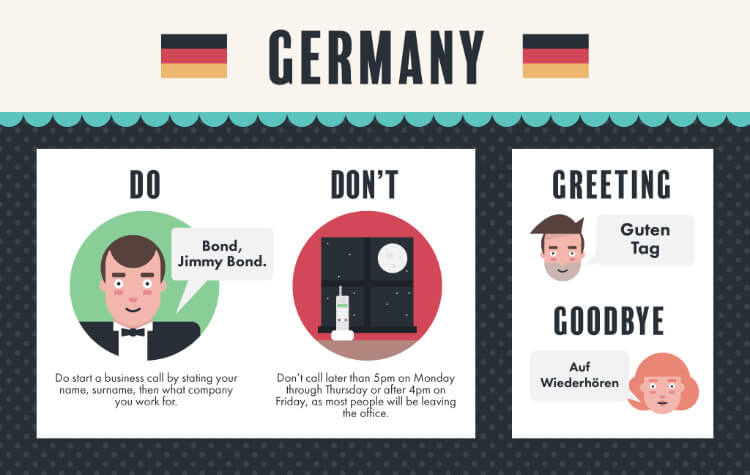According to Google, there are now 3.7 billion people online around the world today. This creates limitless opportunities for businesses to reach and engage with a new audience. This has led to many businesses focusing on international expansion, maximizing their online profile and using virtual phone numbers to increase their local presence. When expanding internationally, it’s important to be mindful of the different business cultures you may encounter. We spoke to business leaders and etiquette experts for advice on avoiding communication mishaps while conducting business across borders – over the phone, or face-to-face.
What is Proper International Phone Etiquette?
When working with clients or customers anywhere in the world, you will have to have in-person, phone, and video conversations to create leads and close deals. This requires businesses to understand proper phone etiquette in different countries, as handling business the way they do locally might not be successful in new markets. Countries and regions have their own international business conventions that are often influenced by local language and culture. International phone and business etiquette is awareness of the differences and subtleties between countries and regions and how to navigate them in order to communicate effectively and win new customers and clients.
How to Communicate With Your International Customers
It’s important you know what to consider when it comes to communication before expanding internationally. In this section, we will focus on some key elements to pay attention to when connecting with global customers.
1. Respect titles
Make sure you are aware of local conventions for addressing the person you’re speaking to. In the US, for example, using words such as “guys” may be common during business meetings, but this could be seen as unprofessional in other countries. In Germany, you’re expected to address people by Herr/Frau, followed by their last name.
2. Listen carefully and ask for clarification
Naturally, when speaking to people from different countries around the world, it can be challenging to interpret everyone’s accent. This could lead to misunderstanding or missing cultural references. To overcome this, listen actively and carefully and don’t be afraid to ask for clarification if you feel like you’ve missed something. You can also make it easier for others by being clear in your own pronunciation and direction, speaking slowly and clearly.
3. Don’t use slang
Local slang can easily cause confusion when speaking to people in a different country or region. Avoid using slang to help communicate effectively with new customers or clients. Even if they understand the slang, it could be seen as a sign of informality, or in some cases case, you could offend someone.
4. Be careful not to talk down to customers
It’s important to speak clearly in your own pronunciation and direction, but you should be careful not to come across as rude or patronizing when doing so. Be patient and focused in your communication and you will come across as approachable and polite.
Phone and Business Etiquette in Different Countries Around the World
Phone and Business Etiquette in the United Kingdom
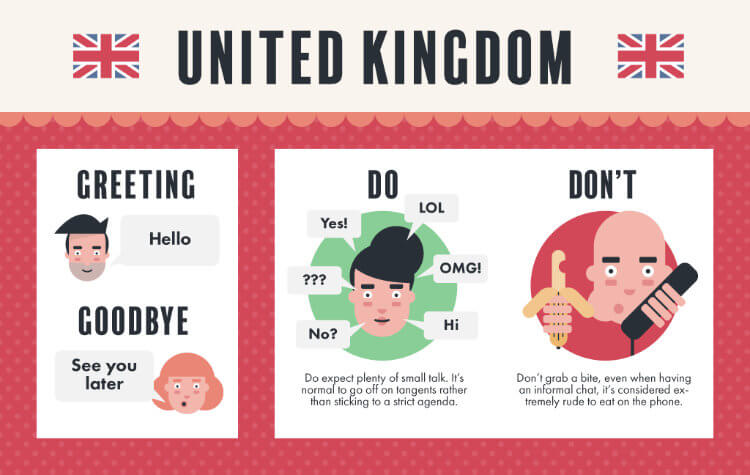
Politeness and manners are key parts of UK society, so expect plenty of niceties and informal conversation before discussing a business venture over the phone.
Time is a valuable resource in the UK, so being punctual is extremely important. If you’re going to be late by a few minutes, a simple apology upon arrival will suffice, but anything longer than five minutes requires a phone call to explain why you are late, and how much longer you expect to be.
Phone and Business Etiquette in Spain

Don’t be taken aback if you end up arguing with a client or colleague over the phone – this is considered normal.
Food is a huge part of Spanish culture, so don’t turn down an invitation to dine before, after, or during a business meeting.
Alexis Chateau, founder and managing partner of Alexis Chateau PR, explained some of the difficulties female businesspeople may encounter in Spain and the Mediterranean: “Spanish men don’t like it when women pay for them, or pay for their own food and drinks in their company. I’ve also noticed the same with Italian and Greeks. If you send a woman to meet with clients from these countries, this can get tricky when the bill comes.”
Phone and Business Etiquette in Italy
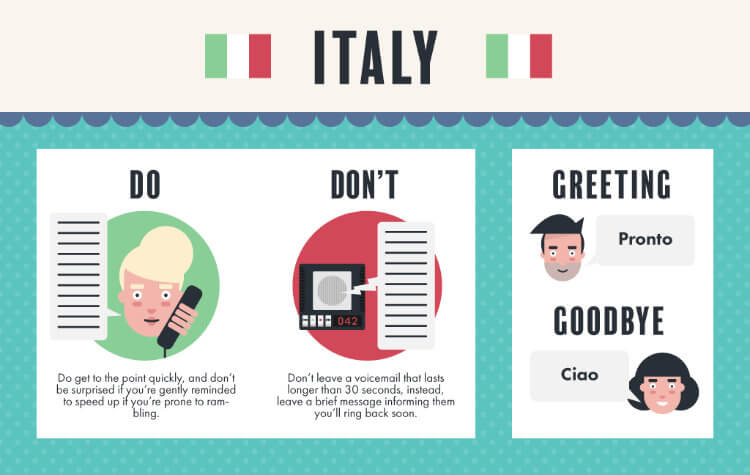
Italian’s don’t like to dilly-dally on the phone. They start a phone call with the word “pronto”, which means promptly – so don’t take up too much of their time!
Agility in business is seen as a positive, with rigid rules and formalities deemed unimportant. Long-term plans are often never realised, as Italian business tends to be focused on the short-term.
Try to build a personal relationship with the people you are doing business with, personality and trust are vital elements of an Italian business deal or partnership.
Phone and Business Etiquette Mexico
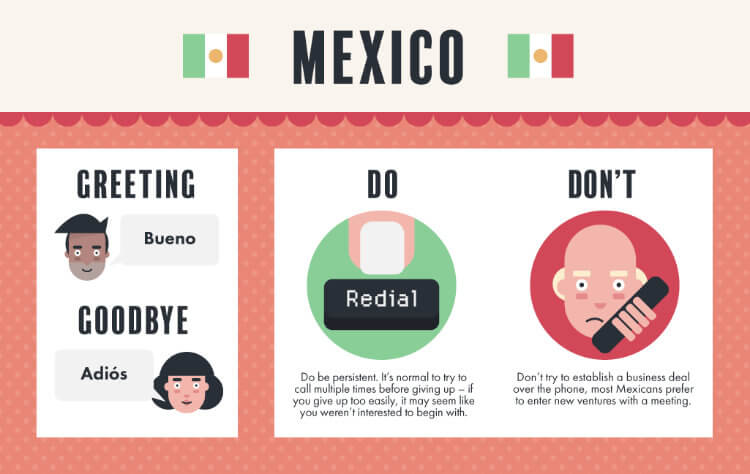
Mexicans may answer the phone with “bueno” which means good. This originates from a period where phone connections were unreliable, so this confirmed the call had been received.
Be punctual to any face-to-face meeting, but don’t expect your hosts to arrive on time. Arriving within 30 minutes of the agreed time is considered acceptable, so try not to be offended if you are left waiting.
Senior members or managers within a company can appear aggressive and unreasonable, but this is simply to draw attention to their importance.
Phone and Business Etiquette in China

In China, it is always acceptable to answer your phone – even in meetings. It’s more acceptable to hold a full conversation under a conference room table than ignore the call.
In a country of well over a billion it can be hard to stand out, so personal relationships are an important part of Chinese business culture.
Etiquette expert Lisa Grotts explained the virtue of patience in Chinese business: “relationships first need to be nurtured in order to do business. When you rush into the decision-making process, that’s when the problems begin. Not everyone’s country is in a hurry like America.”
Phone and Business Etiquette in India
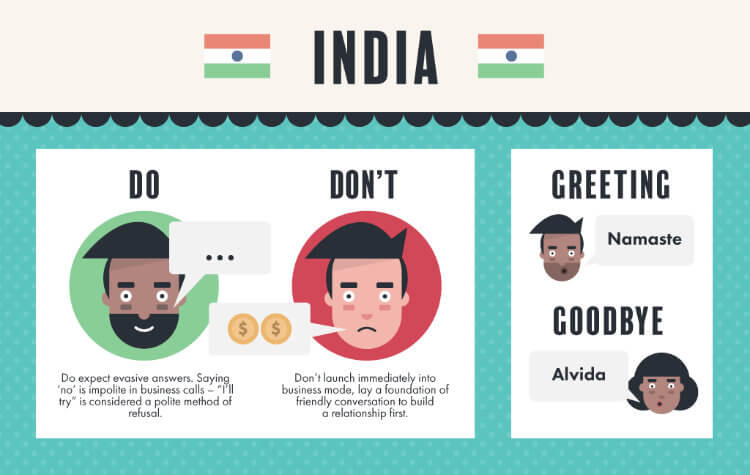
The pace of life in India can change in a second, so be prepared for call interruptions from other departments or secretaries during a call.
Building a rapport can be a significant factor in a pitch or business deal, so having photos of your loved ones handy can be a great way of forging a personal bond.
Rachel Varghese of Reel Volume Promotions explains the virtues of showing your host that they are your number one priority: “Speaking on your mobile phone is expected, but it’s greatly appreciated when you make a point of not choosing to answer a call.”
Phone and Business Etiquette in United Arab Emirates

English is the language of business in the United Arab Emirates, so a knowledge of Arabic isn’t usually necessary. In business calls, “yes” doesn’t mean the same as in the West – it’s more likely to mean “perhaps” or “maybe.”
Despite the incredible heat, a full suit for men and women is appropriate professional attire in the United Arab Emirates.
If a meeting is conducted in a client or associate’s home, try not to admire a decorative item too much, as your host may feel under pressure to offer you it as a gift.
Phone and Business Etiquette in Russia
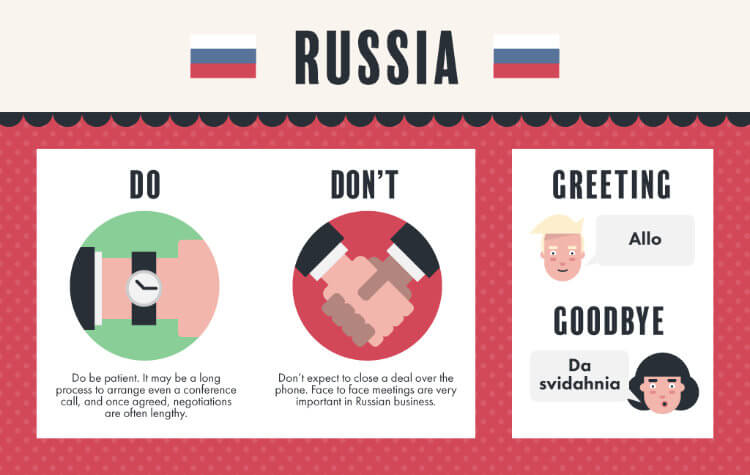
Many Russians still treat telephone communication with suspicion, due to the vast number of intercepted calls during the era of the Soviet Union.
Gift-giving isn’t an unusual practice in Russian business deals, but don’t give vodka as a gift, as this could be viewed as insulting (and playing up to a stereotype), try whiskey instead.
Phone and Business Etiquette in Germany
Germany is a very formal country, especially for business calls. It’s normal to use Herr/Frau (Mr/Mrs) then the surname of the person you are speaking to instead of a first name.
Germany has a reputation as a nation of efficiency, directness, and plain speaking. These three elements are key parts of German corporate life, so don’t be put off if a client is forthright in negotiations.
Respect for authority and hierarchy are both extremely important, so if you’re attending a business meeting as a junior, don’t be surprised if you are never asked to speak.
Phone and Business Etiquette in France

For small matters, don’t pick up the phone at all – French people prefer a quick email unless the matter is very important.
While it may be tempting to speak French, unless your pronunciation is perfect, don’t bother. Most French businesspeople will understand and speak English, preferring not to waste time deciphering unclear dialogue.
Phone and Business Etiquette in Japan
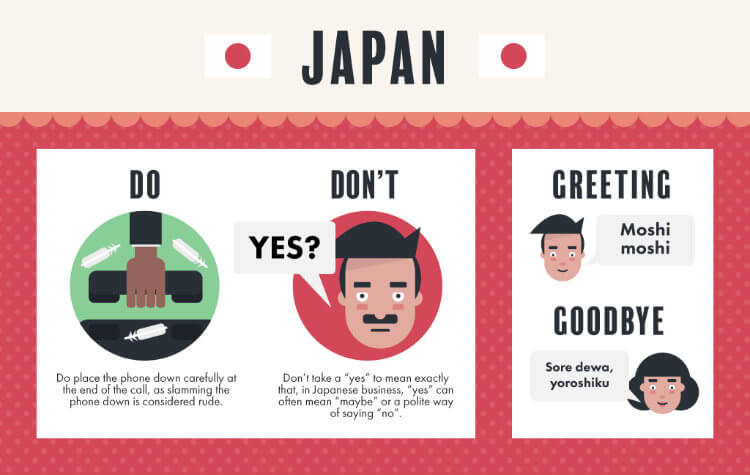
In Japanese culture, it is considered extremely rude to answer a phone call in a public place or on public transport – so make sure you schedule calls for times when you are both in the office.
Conformity and unity are key aspects of Japanese business, with a group consensus usually accepted, regardless of whether an individual on the team disagrees.
Hierarchy based on age or position is also a common trait of the workplace. This strict sense of order can make it difficult for a less senior member of the team to be taken seriously by a client in a higher position.
Phone and Business Etiquette in Australia
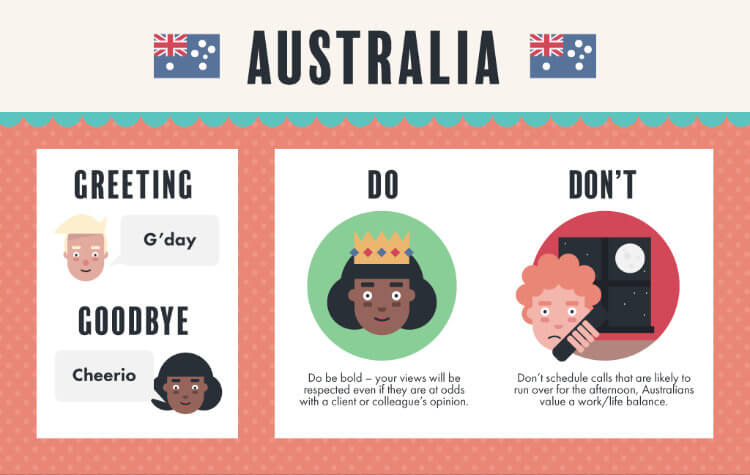
Business down under is often a relaxed affair, so avoid being too formal on client calls, and don’t expect the conversation to be purely focused on business.
In Australia, a casual attitude towards business relationships can mean business and socializing often blend together.
It’s normal to be invited to informal gatherings and BBQs by colleagues and clients, and it’s polite to bring meat and something to drink for your host on this occasion.
Phone and Business Etiquette in South Africa
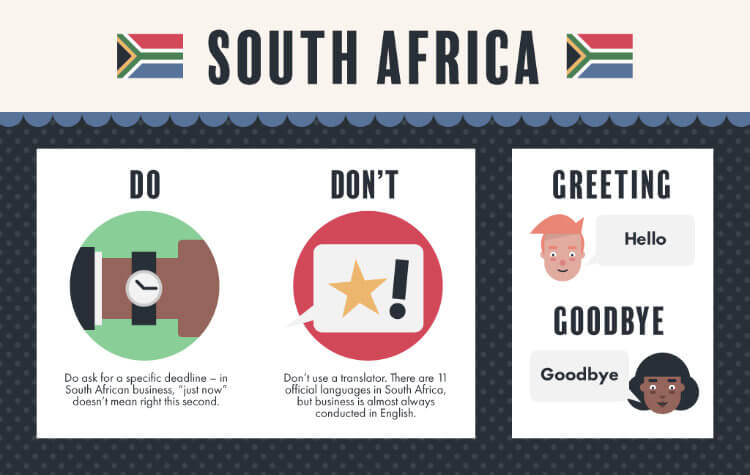
Business in South Africa is based heavily on physical appearances. For this reason, important meetings should be performed in person, rather than over the phone.
South African business is conducted at a slow, methodical pace, with key decisions typically made by senior members of a company – so don’t expect fast negotiations.
Jamie Gelbtuch, founder of New York based company, Cultural Mixology, explained the benefits of being open in South African business: “When building relationships, you can ask and expect to be asked personal questions. For example, consider asking someone “What was it like for you growing up?”, and ‘How is it different now?’”
Phone and Business Etiquette in USA
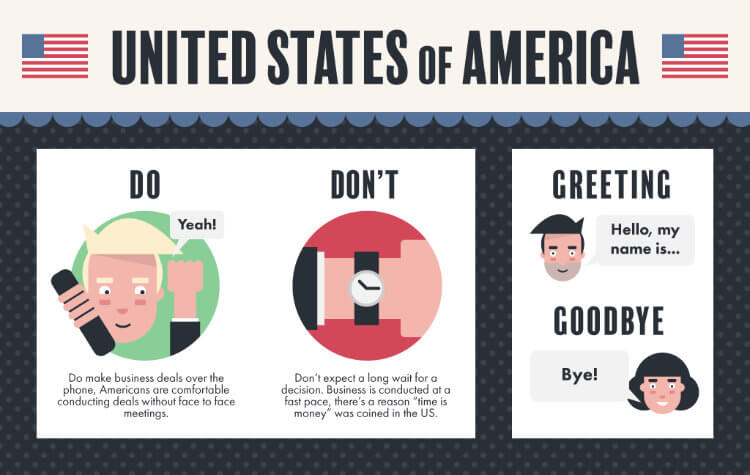
Americans are direct and straightforward with phone negotiations, there’s usually little subtext, and ‘yes’, ‘no’, and ‘maybe’ mean exactly that.
While business meetings are informal, punctuality and deadlines should be strictly adhered to. Personal relationships aren’t important, the best deal or the best price will almost always win the day.

